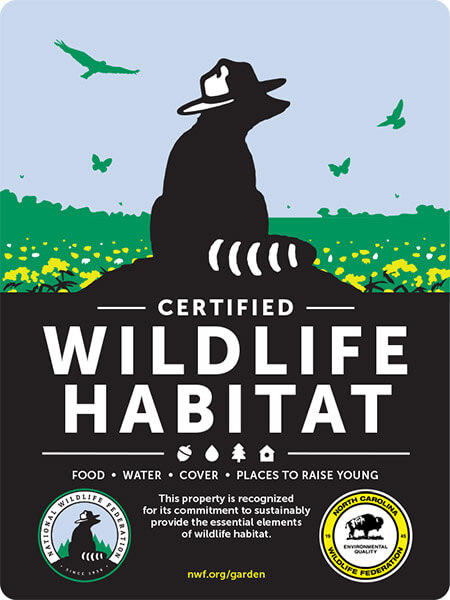Certified Wildlife Habitat
North Carolina Wildlife Federation supports wildlife habitat, garden, and restoration programs unique to the flora and fauna native to our state.
Since 1973, the National Wildlife Federation’s Garden for Wildlife programs have been educating and empowering people to turn their own small pieces of Earth- their yards and gardens- into thriving habitats for birds, butterflies and other wildlife.
Together, NWF and NCWF realize every habitat garden is a step toward replenishing resources for wildlife locally and along migratory corridors.
Recognize your commitment to wildlife and certify your yard, balcony container garden, schoolyard, work landscape or roadside greenspace into a Certified Wildlife Habitat®. It's fun, easy and makes a big difference for neighborhood wildlife.
The application processing fee will be $25 starting March 1st, 2025. In addition, your application processing fee supports the National Wildlife Federation's programs to inspire others to make a difference and address declining habitat for bees, butterflies, birds, amphibians and other wildlife nationwide. A portion also supports the work in our state!
Community Wildlife Habitat
In conjunction with NWF, NCWF takes individual properties further by certifying communities as Community Wildlife Habitats. Community Wildlife Habitat program partners include cities, towns, counties, neighborhoods and communities of all kinds to become healthier, greener and more wildlife-friendly.
Community Wildlife Habitats garden and landscape with wildlife in mind, promote the use of native trees and plants, work to reduce or eliminate the use of pesticides and chemicals, and integrate wildlife-friendly practices into sustainability plans and park master plans. Through this program, your communities can enhance and restore islands and corridors of wildlife habitat in urban and suburban areas nationwide while at the same time connecting to existing work around climate resiliency, community resiliency, urban forestry, water conservation, beautification, and more.
Communities earn community-wide certification by certifying individual properties (homes, parks, schools, businesses and others) as Certified Wildlife Habitats and by doing education and outreach in their community. Education and outreach points are earned by engaging community members in habitat restoration projects, providing resources like native plant lists, and communicating through websites and social media. Download the Community Wildlife Habitat program certification requirements. Contact Director of Conservation Partnerships at (info@ncwf.org) for more details on certifying your community.
Attracting Wildlife Into Your Yard
Attracting wildlife into your yard is as easy as providing food, water, cover and places to raise young. Here are some ideas to get you started in your yard:
- Food: Native plants provide wildlife with nectar, seeds and berries. Feeders can supplement.
- Water: All animals need water to survive and some need water for bathing or breeding.
- Cover: Wildlife needs shelter to escape bad weather and predators.
- Places to Raise Young: Wildlife needs special habitats for bearing and raising young.
Map of NC Certified Wildlife Habitats
Join the Cause and Make an Impact
Help NCWF preserve wildlife and habitat for our children and future generations. Learn More.


